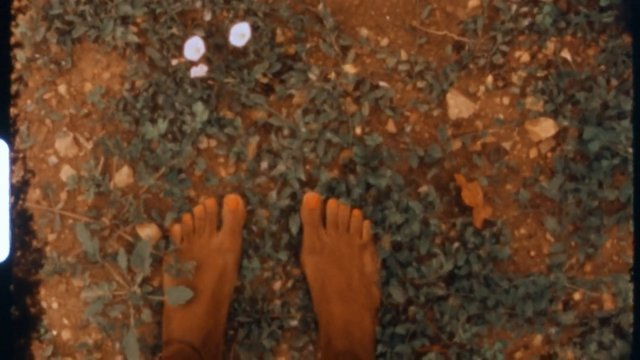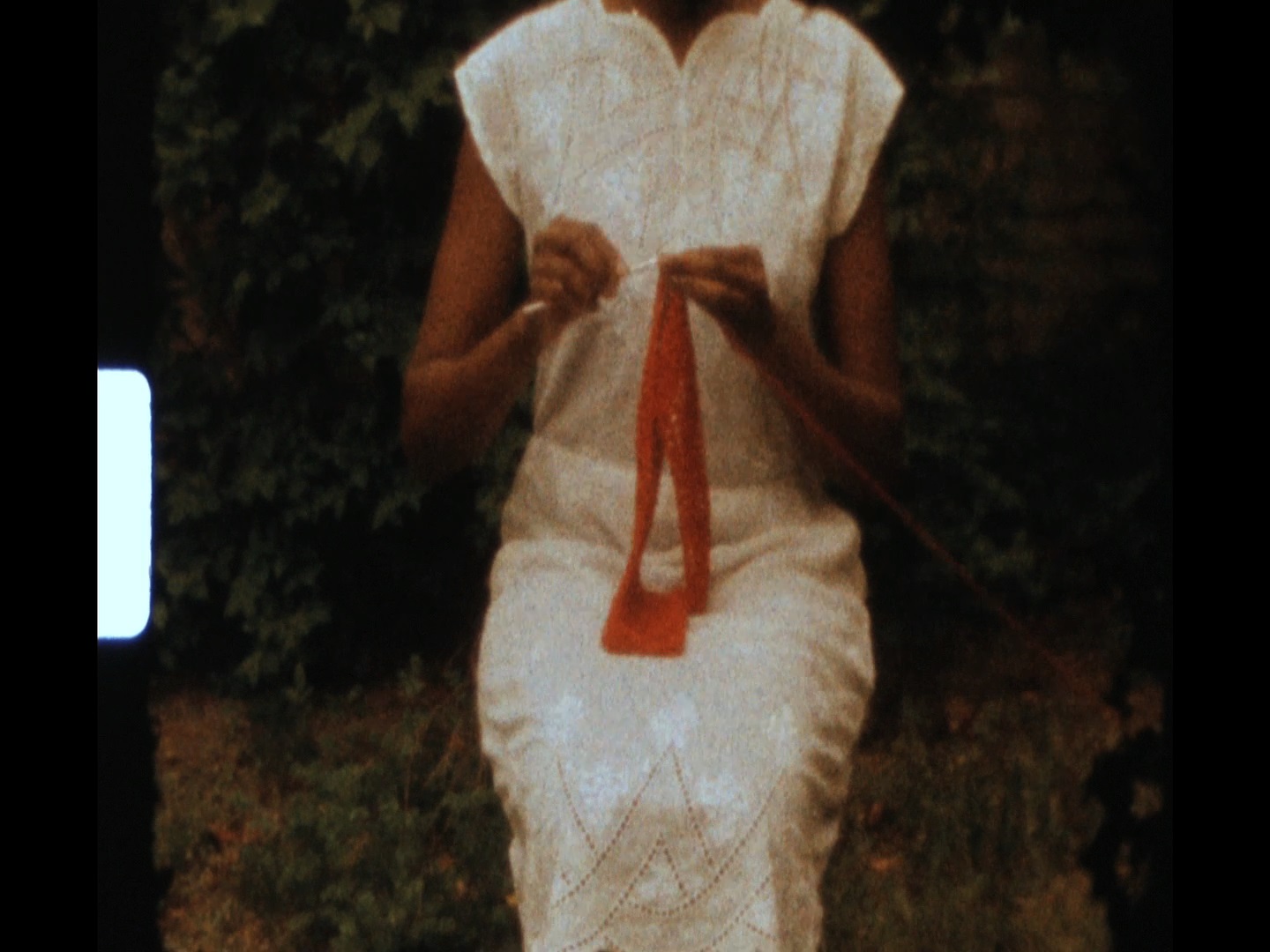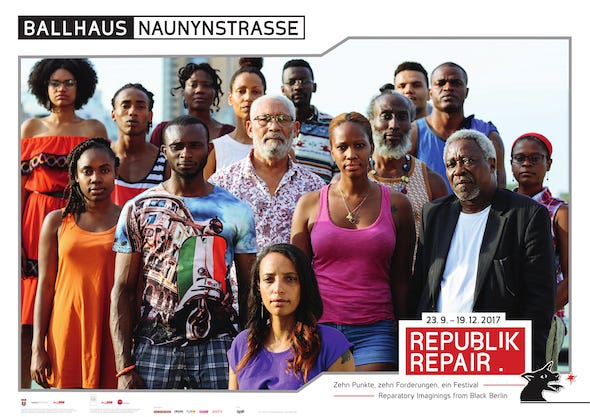Studio Visit with Karina Griffith
Studio Visit with Karina Griffith
We met with District Berlin's current studio grant holder, Karina Griffith, whose practice comprises film and installation, often in tandem, as well as curatorial projects and organizing talks, conferences and events within the frame of her current research on Black authorship in German cinema.
A field of work spanning the visual and the tactile – through explorations of the tangibility of the moving image, embodied spectatorship, and the relationship between film and affect – unfurls upon entering District’s Malzfabrik location. Crocheted works and spools of yarn, in particular – amidst an assortment of books, posters and images – invoke physical connection and proximity, as well as a sense of rhythm, repetition and time unfolding. Film stills and various images depicting filmic processes and technologies fleck one wall of the studio, offering a glimpse of a selection of topics with which Griffith is currently engaged. Among the images are those that surround the objectifying, alternately close-up and distanced view facilitated by the camera and related optical devices – the ability to see both far away and in extremely close detail. These, alongside a Shirley Card, which set color-coding – skin-tone – standards for film, map the intertwined histories of the camera and the development of photographic technologies with that of colonialism and ethnographic research. Griffith spoke to us about this embeddedness, the essentiality of being able to reproduce one’s own stories, and what she's focusing on during her time at District.
How long have you been in Berlin?
I've been here a long time now. I came for the first time in 2004, for the Berlinale Talent Campus, and got to work on a film by the Polish director, Tomasz Wolski, as part of the Berlin Today Award. It was called, If I Were a Fish. It's a great film; it’s about a man who lived in Berlin for a long time, right around the time when Poland was vying to be part of the EU. He didn't feel at home in Berlin. He was saying that he didn't want to die here, but then when we went with him to Poland, he said he couldn’t live there either. He was caught between these two worlds. At the time I didn't fully understand it, but now that I've been here on and off since 2004, I get what he means. Berlin spoils you for the rest of the world. Then, I came back to work for this electronic music booking agency, planet rock. I was working for Christoph Linder. I don't know that people understand how vital he was for creating a scene in Berlin and Germany, more broadly. At the time, we were booking Felix Kubin, Carsten Nicolai, and Jamie Lidell – these seminal electronic music artists. He's got a great ear for sounds that tell stories. I was really fortunate that was my introduction to Berlin. Then I started making my own projects and realized that this is a great space to hone your own practice.
So did your interest in working within the German context grow out of just being in Berlin, researching and seeing what's going on here?
Yes. Back then it wasn't like it is now. There was somewhat of a scene here (Joliba e.V. has been around since the late 90’s and ISD and ADEFRA even before that) , but now there are more organizations for and by the Black arts community, like Ballhaus Naunynstraße, which has a mandate for Black perspectives. That only started when Wagner Carvalho became creative director – which I think was around 2012. And places like Savvy Contemporary also didn't exist then, or collectives like the Soul Sisters... Now, I’m doing my PhD research on Black authorship in German cinema. I went back to Toronto for two years to work on that, and then came back to Berlin last year. I feel like I’m fresh in Berlin again. So much happened in the last two years – something's changed for the better. On the other hand, of course, there was always this bubbling of an alt-right sentiment happening in Berlin. It's not as though it came out of the blue, but that last election really made visible what I think a lot of people of color already knew – that this is something that the state allows to fester.
What are you working on here in the residency at District? Is it closely related to your PhD research?
I research Black filmmakers in Germany, and District was looking for a de-colonial engagement with 1968 – called Decolonize 68. So, what I proposed was to look at Black African film students who came to Germany in and around 1968. For instance, King Ampaw, who is a Ghanaian filmmaker that studied in Potsdam and Munich, and made his first feature film here. He then went on to make seminal films and documentaries in Ghana. He had studied with Wim Wenders and Werner Herzog, and was actually in a Werner Herzog film – Cobra Verde. The work right now has been trying to get the archives to open up, which is always a difficult task. So, that's where the impetus comes from, but the main project is really to think about the camera apparatus itself and how it can possibly be decolonized – because the camera is embedded within the history of colonialism. I’m asking how we can disentangle it, or, at the very least, how we can better acknowledge its history.

Unkraut, 2014 (still)
In addition to studying film, you also work with film and video yourself.
I am a maker/practitioner, as well. I like to work with Super 8, because I love what the aesthetic does to audiences. I’m interested in how it signifies. But I also view my camera as a collaborator. I use this Bauer C 505 XL, which is kind of broken – the lens is off a little bit. You're also supposed to clean it, but I don't. I like to let it accumulate debris on the edges, which then flickers in the films. For me, this is the camera communicating back – it has it's own language. I don't like the idea of alles sauber zu machen, and trying to create this objective, 20/20 vision. It’s such a disinfected way of looking at the world. I like all of the seams, the blurriness, and the handheld quality.
I was trying in one of my recent pieces to forget storytelling conventions. But it's so hard to forget once you know them. I think it’s also the same with history; there's so much of this trying to erase and forget history, but it's not possible. There's this type of Erinnerungskultur, which I think is a nice movement forward. But more than just remembering, we have to really figure out a practice. What are we going to do? How are we going to right these wrongs?
And what about your installations? How do they function within your practice?
I usually do installations with moving image. I’m interested in this dimension of space and the idea of a moving, mobile spectator – a spectator that's able to walk around, as opposed to being in a stationary, cinematic position, where you sit and enter the imaginary. It's so hard, especially as a Black spectator, to really enter the imaginary. That's what bell hooks meant when she talked about oppositional gaze – that Black female spectators are always on guard, and that we set ourselves up in this position as narrator outside of the text. I think it's really interesting to play with that in an installation, where you definitely intervene in this idea of settling into a type of reception. You have the possibility of moving and changing your point of view on the work.
Aside from moving image, what other media and materials do you work with in the installations?
I like to work with wool and textiles, and I crochet. I did an installation a few years ago called ‘Homecoming’, where I projected through a crocheted screen. For me, crochet is interesting, because it's a skill that was handed down to me from my mom, and had been handed down to her from her mom. The project ‘Homecoming’ explores something that I’ve always wondered – how crochet came to Guyana, where my family is from. And it’s about acknowledging that it probably came to Guyana, which is part of the Caribbean, through colonialism. At the same time, there is this type of crochet called Tunisian crochet, so maybe it actually came from Tunisia and then went to England, Ireland and Wales, and then the Caribbean. This transnational, transatlantic learning and skill sharing is interesting. For me, crochet really embodies the fact that there is not a linear story; time doesn't move in a straight line. Where we really mess up, is in believing that something came first and then something after it. That’s when we start to think of a false progress narrative. That's where we lose the details of our stories. Because when we slap them onto this timeline, we lose all of these other wonderful, eccentric pieces that are part of the whole story.

Homecoming, 2015 (still)
There are a few balls of yarn on the desk. Are you working on crocheting something new?
Yes, I'm crocheting again. I’m interested in changing the idea of what a screen is and the notion that it’s just a flat, empty, blank space; maybe that's where de-colonial thought lies. Maybe it's not even with the camera, but with the screen. I did a workshop as part of Art of the Revolt // The Revolt of Art in the Frankfurt Student House in April, where I went through a whole history of the camera and the apparatus, starting with the idea of the magic lantern, through the early experiments of Johannes Kepler. Then, at the end, we started thinking about a manifesto for a postcolonial camera. One of the people in the workshop said that, considering what I had said before, they weren’t sure that we could really decolonize the camera, because it's all wound up in and comes from this history. It really made me rethink this project and my aim. That's the best: when you do a workshop and then, as the workshop leader, learn something about yourself. So, I’m thinking maybe the answer is not in decolonizing the camera, but in decolonizing the audience and the screen.
Can you talk a bit about the festival you organized with Ballhaus Naunynstraße last year: Republik Repair? You invited artists to interpret the Caribbean Ten Point Action Plan – in what ways did those then materialize?
The points were: full formal apology, repatriation, indigenous peoples development, cultural institutions, public health crisis, illiteracy eradication, African knowledge program, debt cancellation, technology transfer and psychological rehabilitation. So, CARICOM – which is the community that comprises, I believe, 15 member states in the Caribbean – had come up with a list of what reparations mean to them. Then, for the festival, it was about thinking through what it means for those of us in Berlin. For instance, repatriation for them is that people who are of the African diaspora and living in the Caribbean should have the right to repatriate and go back to Africa. We interpreted that through the idea of repatriating our own stories. That was what Walking Large – which was a theater play with four Black German actors, a Black German writer (Toks Körner) and a Black German director (Atif Mohammed Nor Hussein) – was about: this idea of reclaiming space on the German stage.. It’s also about the idea of returning to our own stories. That’s why I invited Philipp Khabo Koepsell, from Each One Teach One e.V., who's also a great poet and writer. He has a project, Sankofa DDR, where he asks the Black community in Germany, not just Berlin, to donate ephemera – old pamphlets, posters and so on – to an archive that he’s built. So, I asked him to put together a little collection to show and to do a poster exhibition and have a talk about. There are amazing things in this archive: they have old copies of Afro-Look, which was a Black German magazine. So, it’s this idea of the archive and who's in it; it’s about repatriating our own stories, and our own histories. Each of the points was interpreted in a different way. When I talked to the artists, it was about thinking through what reparations would feel like. How would we walk down the street if we suddenly got what we asked for? We have to have an understanding of what we want. Maybe that's why I’m so interested in affect; I want to know, tangibly, what something feels like. That's what art can do – through it, we can try to imagine and create these types of models. There was this idea of interpreting each point artistically in order to make us feel and think, but it was also about having discussions grounded in the original meaning of the 10 points. This great scholar and activist, Latisha Cairo Reddick, came, because one of the points was indigenous peoples development. In thinking about how we were going to talk about indigenous peoples development in Berlin, for me, it was really important to get somebody from the community. So, she's Afro-Guyanese Canadian, like myself, and she's also part of the Mi’kmaq organization from Nova Scotia. She said something that really stuck with me: so often the stories that we tell are mediated by whiteness. You’ve gone your whole life and suddenly realize that most of the stories you've been told have a white protagonist, who's the person discovering the world for you. These are the eyes through which you see everything. You try to then find the other stories in and around that, but it's just the default model in which history is recorded and taught in Canada and in Germany. That has to change. We need to have our own stories.

Photo credit: Clarita Maria
Do you have plans to organize another iteration of the festival? What else is coming up next for you?
It would be wonderful to do it again. I would definitely be open to it. And maybe in another space, in another city, where we could bring some of the works that were developed during the festival here, but then also engage with other local artists so that they can reinterpret the points to address what it means for them. We're also putting together a publication now that documents the whole festival, which I’m looking forward to sharing. I’ve just co-organized a conference at the University of Toronto, called Transnational Perspectives on Black Germany. We invited Fatima El-Tayeb and Noah Sow, and we introduced a Toronto audience to Sheri Hagen and her wonderful film, Auf Den Zweiten Blick. I’ll also be organizing a few more talks during the residency, as part of the process. I’m here in the studio at District until September, and at the end there will be an exhibition.
***
UPCOMING EVENTS Lessons from '68: Soul! Open Television & Queer Black TV June 1 - June 3, 2018 more info Hearing Now: Optical Silence - Karina Griffith O.T. Bar & Projektraum June 21, 2018 | 7pm more info